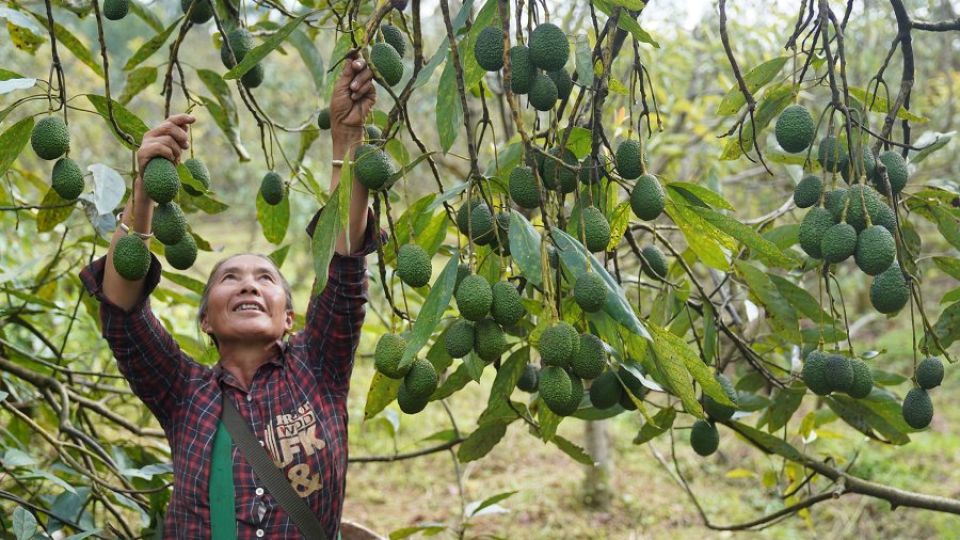September 26, 2024
MENGLIAN/KUNMING – Editor’s note: In a series of reports titled “Claims to Fame”, China Daily looks at how some regions have earned wealth and recognition through specific products to realize the goal of rural vitalization.
Traveler Jiang Chaochao added remote Menglian county in Yunnan province to her bucket list of destinations this year because of its reputation as China’s “Avocado Town”.
“For fitness enthusiasts, this is a huge bonus,” said Jiang from Hunan province, who exercises regularly and tries to eat healthy food. “I was excited to learn that in China we have a town that can produce lots of avocados,” she added.
During her visit in August, Jiang tried avocado coffee and other unusual dishes made with the fruit. “Avocado coffee is smoother than a regular latte, with the fresh avocado aroma blending seamlessly with the coffee’s caramel and fruity notes. It’s a low-calorie, healthy drink that’s also invigorating,” she said.
Wang Longsheng, 32, from Hangzhou, Zhejiang province, also enjoyed the intriguing blend during his stay in Menglian. “I had never heard of, or tasted, avocado coffee before coming here. But after tasting it, I found that the combination is more than the sum of its parts. It retains the distinct flavors of both ingredients while being refreshingly smooth,” he said.
Wang’s journey to Menglian in April was driven by the town’s dual allure: its renowned coffee and its reputation as “Avocado Town”.
Coffee is one of the cornerstones of the local economy, contributing an output value of 1.23 billion yuan ($174 million) in 2023. The county’s coffee plantation area reached 6,636 hectares this year, with 116 market entities involved in the coffee business, according to the latest data of local government.
Upon his arrival, Wang was delighted by the town’s vibrant coffee culture. “The coffee street here is impressive, with shops operating late into the night, which is said to be their peak business time, the opposite of the urban work schedule. Many of the coffee shop owners are also well-versed in coffee culture,” he added.
While avocado-related tourism products are in their infancy compared with coffee, Wang sees their great potential. “Avocado dishes in Menglian are versatile and memorable, combining well with a variety of cuisines, including Chinese dishes. Avocado beverages are also plentiful, showcasing the fruit’s compatibility with numerous recipes,” he said.
The full name of the county in Pu’er, Yunnan province is Menglian Dai, Lahu, and Wa autonomous county. Its avocados are not just a trendy superfood gracing the tables of the middle-income group. Here, they are a beloved local specialty, deeply integrated into the daily lives of the residents.
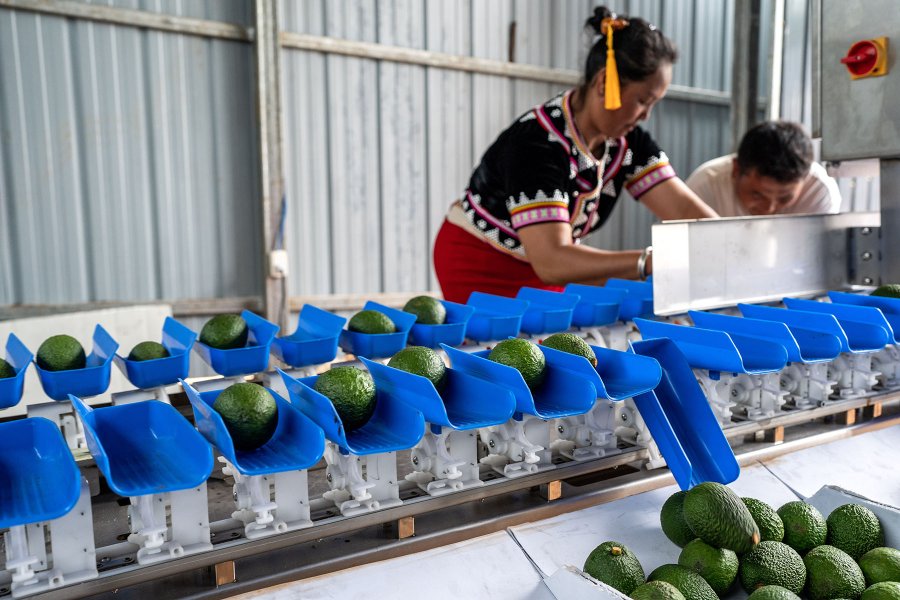
Workers sort avocados at a plantation in Menglian in September 2024. PHOTO: XINHUA/CHINA DAILY
Local specialty
“For us locals, avocados are a common food,” said Zha Ke, a 36-year-old farmer from Menglian.
“Even the elderly eat them regularly now, and young women use avocados from their own trees to make face masks. During festivals and family visits, we always serve avocados to our guests. When we visit friends, we bring avocados as gifts.”
In Menglian, avocados are enjoyed in a variety of ways beyond the typical avocado milk and yogurt. Favorites include avocado coffee, avocado with wasabi and soy sauce, fried avocado, and avocado chicken stew. Some restaurants even offer avocado feasts, featuring eight dishes with the fruit.
Zha Ke, who is from the Wa ethnic group, likes avocado chicken porridge, a dish that blends traditional Wa cuisine with the creamy fruit.
Avocados, which originated in Mexico and spread to Central and South America, are now primarily produced and exported by Mexico, Peru and Kenya.
The delicious and nutritious fruit has gained in global popularity due to its association with a healthy lifestyle. Rich in fats, dietary fiber, protein, and vitamins, yet low in sugar, avocados are versatile and can be enjoyed both as a vegetable and a fruit.
In Menglian, avocados have transitioned from an imported novelty to a local specialty thanks to the region’s natural advantages and the collaborative efforts of the local government, enterprises, and farmers.
In 2007, Qi Jiazhu, general manager of Pu’er Green Bank Biological Co, began researching suitable locations for avocado cultivation in China. After setting up trial fields in Guangdong, Hainan, and Yunnan provinces, as well as the Guangxi Zhuang autonomous region, the small town of Menglian emerged as the most promising site.
“Menglian and Uruapan in Michoacan, Mexico, the world’s top avocado region, are almost on the same latitude and have very similar climates. Menglian’s suitable temperatures, ample rainfall, and unique karst topography matched the avocado’s preference for moisture without waterlogging,” Qi said.
“Even during dry spells, the Nanlei River flowing through Menglian’s Mangxin town ensures the avocados receive natural irrigation. Since 2007, we trialed over 100 avocado varieties from around the world in Menglian, but most did not perform satisfactorily,” he recalled.
After eight years of testing, his team selected 12 promising varieties, but mainly Hass, for cultivation in Menglian.
“If developed well, Menglian could become a production center for avocados in Asia,” Qi said.
In 2015, large-scale planting began in Menglian. However, promoting the large-scale cultivation of an unfamiliar exotic fruit among local villagers was not easy.
Zha Ke first heard about avocados in 2016.
“When officials promoted avocado planting, we were hesitant because we had never heard of avocados and were worried about market demand and income,” he recalled. “But after researching online and learning about the high demand for imported avocados, combined with the village’s promotion and the ‘334 collaboration model’, we decided to give it a try.”
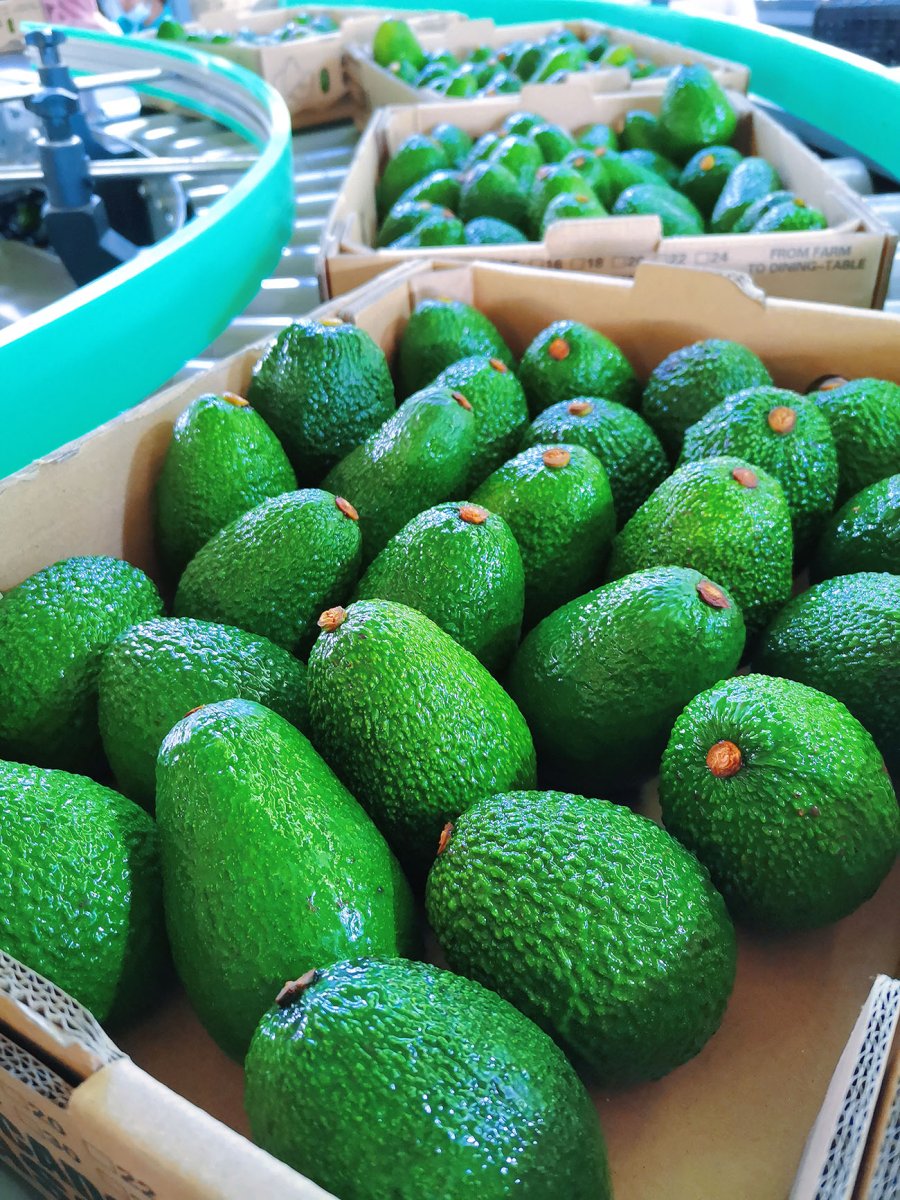
Avocados are packed at a plantation in Menglian. PHOTO: XINHUA/CHINA DAILY
Sharing profits
The 334 collaboration model, developed by the local government and enterprises, is a profit-sharing mechanism where farmers contribute land for a 30 percent share, enterprises provide seedlings and technology for another 30 percent, and State-owned management companies, village cooperatives, and village collectives, hold the remaining 40 percent.
This model ensures that farmers get a share of the profits and guarantees a minimum income of 300 yuan per mu (0.06 hectares) of land during the initial three nonharvest years. It also means that the company and the village collective share the risks with the farmers.
Yang Hua, the Party Secretary of Mangxin town, was one of the first to promote avocado cultivation to farmers. “Compared with crops like corn and sugar cane, avocados offer higher economic returns,” Yang said. The 334-collaboration model was also a crucial factor in convincing farmers to participate.
Zha Ke, persuaded by this model, decided to lease his 7 mu of land to the cooperative for avocado cultivation in 2016, despite never having seen or tasted an avocado. But his bold decision has since brought him and his family substantial income. “Last year, I earned 47,000 yuan in dividends from my land,” he said.
In addition to dividends, Zha Ke earns 120 yuan a day working at an avocado orchard. “Overall, avocados have increased my annual income by about 50,000 yuan,” he said.
As more villagers witnessed the benefits of avocado cultivation, participation grew.
“In our village group of 146 households, almost every one now grows avocados,” said Zha Ke from Mangxin village.
“Even if they don’t plant them in their fields, they have avocado trees growing in their yards or around their houses.”
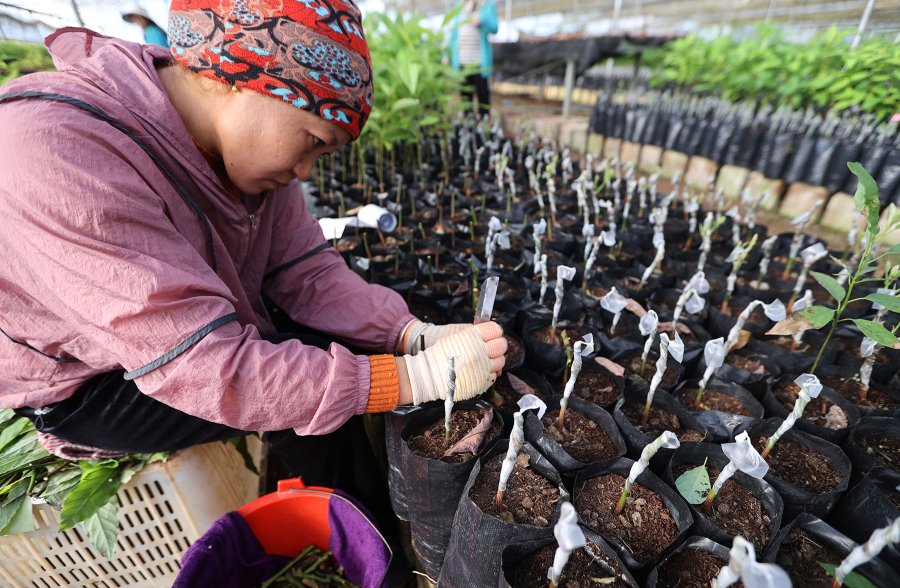
A farmer checks grafted avocado seedlings in her plot in Menglian. PHOTO: XINHUA/CHINA DAILY
Transforming Menglian
Seventeen years ago, Qi Jiachu planted the first avocado seed in Menglian. Today, Menglian has transformed into the Avocado Town of China, producing about 80 percent of the country’s avocados and replacing 15 percent of imported ones.
According to data from Chinese Customs, in 2023, China imported over 65,626 metric tons of avocados worth around $151 million from nine countries, including Peru, Chile, Kenya and Mexico. The top three provincial-level regions for avocado imports were Shanghai, Guangdong and Zhejiang.
The avocado industry in Menglian now supports 11,000 households and 35,000 people, more than a quarter of the county’s population. Its avocado plantations cover 118,900 mu, which yield 19,500 tons of the fruit and generate around 680 million yuan in revenue last year.
Compared with imported avocados, domestic ones have an advantage due to their higher dry matter percentage, Qi said. As the dry matter percentage in an avocado increases, so does its oil content. More oil content results in a richer flavor.
As China’s largest domestic avocado production area, Menglian is striving to set the industry bench mark for domestic avocados. “Menglian Avocado” has been successfully registered as a National Geographic Indication Certification Trademark.
“Imported avocados are picked at 50 to 60 percent ripeness to endure the long journey from the Americas to China, which takes about a month,” said Qi.
“By the time they reach consumers, they have been collected from trees by 50 days to two months.
In contrast, domestic avocados in Menglian are often picked at 80 to 90 percent ripeness or fully ripe. This results in a higher dry matter content, usually exceeding 25 percent. This tree-ripened quality gives domestic avocados a significant advantage in the market.”
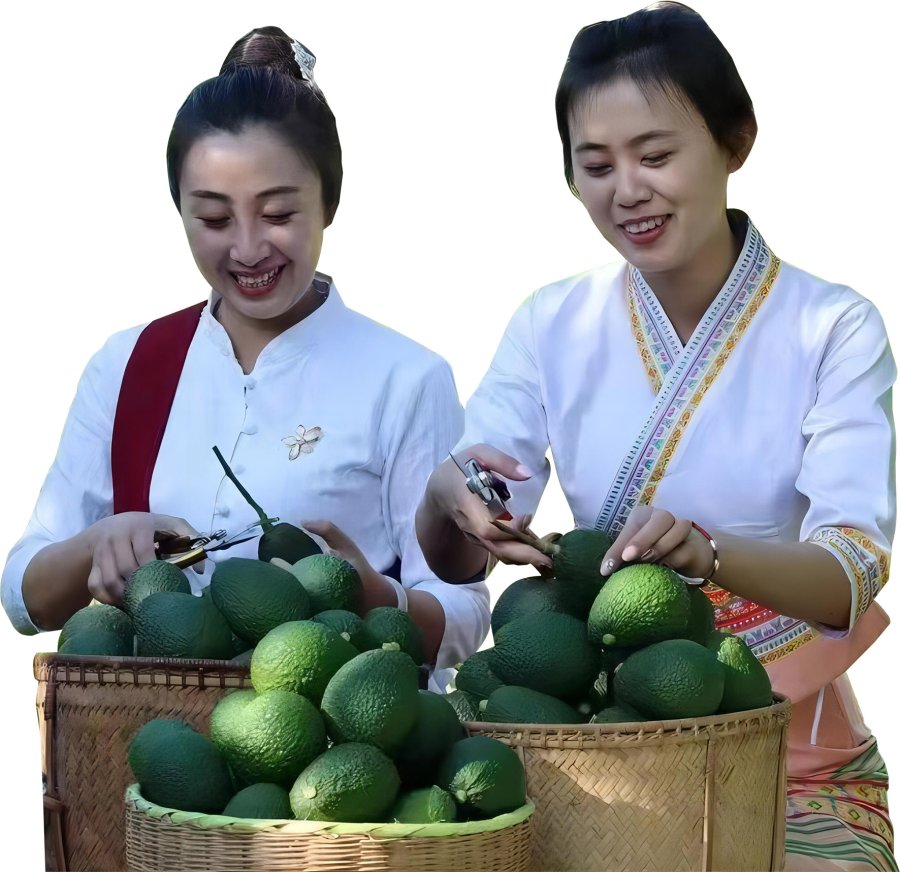
Villagers dressed in Dai ethnic group costumes display harvested avocados at a plantation in Mangxin, Menglian, in November 2022. PHOTO: XINHUA/CHINA DAILY
Spreading the love
Menglian is also innovating on the sales front.
Diverse channels such as e-commerce, supermarkets, and wholesalers are being leveraged to ensure their avocados reach major cities including Beijing, Shanghai, and Guangzhou and Shenzhen in Guangdong province within 72 hours of being picked.
In 2021, Menglian avocados debuted in 18 Freshippo stores, Alibaba’s fresh-food chain. In November 2022, the first avocado “Freshippo village” was inaugurated in Mangxin, making it the only such village in China despite its remote location. The partnership with Freshippo helps Menglian benefit from, and build upon, a nationwide supply chain for ripe domestic avocados.
Menglian’s avocado-related tourism is also gaining attention. Last October, the town hosted its first Avocado Festival with 119,300 tourist visits during the weeklong National Day holiday, generating income of 106.88 million yuan, according to official data.
Two avocado orchards that integrate agriculture with tourism, leisure, and wellness experiences have been established. Plans are also underway to develop an avocado-themed town in Mangxin. On Oct 2, Menglian will once again host the Avocado Culture Festival.
The booming avocado industry has attracted young people back to Menglian, offering employment opportunities that rival those in urban areas.
Party Secretary Yang said the avocado industry provided over 10,000 job opportunities for the local community last year, particularly during the four- to five-month long harvest season, with daily wages ranging from 100 to 120 yuan.
Currently, 3,000 households in Mangxin cultivate avocados on 30,000 mu of land, increasing the average household income by more than 6,000 yuan.
The county aims to plant 100,000 mu of avocados, boost cultivation, and produce 100,000 tons of fresh avocados annually, with 40,000 tons for processing. It is working on building an advanced processing park for high-end products like avocado oil and puree, extending the industry chain and adding value.
Apart from economic gains, avocado plantations also bring ecological benefits.
Farmer Zha Ke has noticed environmental improvements that avocado cultivation has also brought.
“We used to grow sugar cane and had to burn the leftover stalks, which made the air really unpleasant, especially in the hot months from April to June. Since switching to avocados, there’s been much less burning, and the air quality has improved,” he said.


